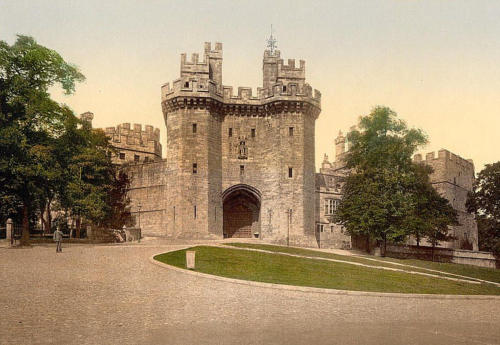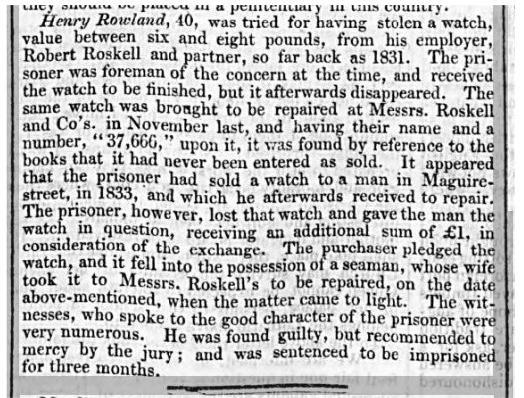In 1839 Henry Rowland was convicted of stealing a watch eight years
previously and was jailed in Lancaster Prison.
The cutting on the right tells the story. It is from the Liverpool Standard
and General Commercial Advertiser, 8 Mar 1839.
County of Lancaster
Register of all Persons charged with Indictable
Offences at the Assizes and Sessions held within
the County in the Year 1839
Henry Rowland
Degree of Instruction : Well
Age : 40
Session : Liverpool Borough Session - 5 Mar 1839
Offence : Larceny by Servant
Imprisonment : 3 months
Once the only Assize for the county, Lancaster saw a vast number of people pass through its doors, accused of various crimes, many of which were, until the end
of the 1820s, punishable by death.
Lancaster Castle housed two treadwheels – one to drive 23 calico looms and one to draw water from the well. The first one was installed in 1822. Lancaster’s use
of the treadwheels was unique as most prisons did not harness the energy in any useful way.
During the summer, male and female prisoners sentenced to hard labour on the treadwheel had to work 10 hours per day, at a rate of 96 steps per minute. They
were allowed to rest for five minutes in every twenty. Four prisoners were allocated to every three spaces on the wheel, thereby allowing one to rest for five
minutes while the rest of the team continued to turn the wheel.
When prisoners finished their 15-minute stint, they would climb down to sit on a stool, whilst the prisoner who had been resting took his place. The turnkey
(prison officer) in charge of the wheelhouse was in full control and shouted out his orders each time the wheelhouse clock chimed the five-minute interval. A rule
of total silence was strictly enforced and the spaces on the wheel were partitioned to frustrate communication between the prisoners.
This excerpt is based on information on the Lancaster Castle website. We don’t know if Henry Rowland was forced to use the treadwheel but it would
have been preferable to some of the other punishments meted out in Lancaster Castle/prison in slightly earlier times.










